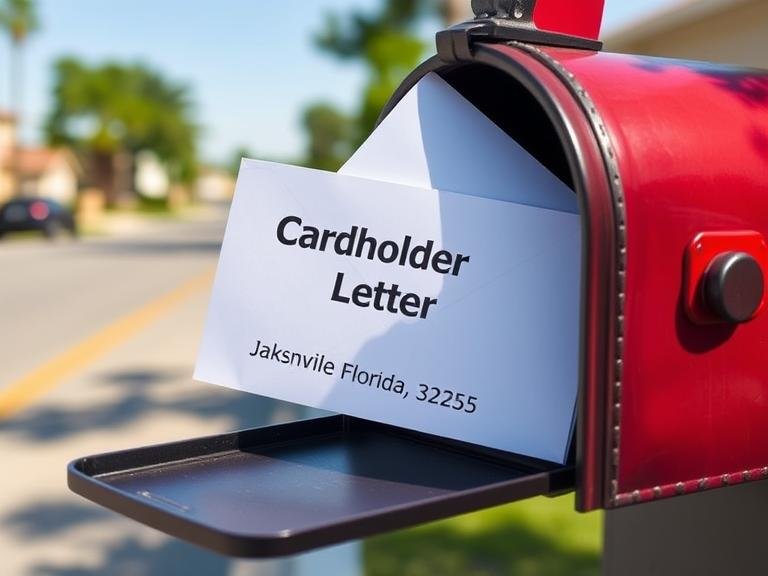When people receive unexpected mail, especially with official-sounding terms like “Cardholder Services Letter Jacksonville Florida 32255”, it often sparks concern, curiosity, or confusion. Many wonder if such a letter relates to their credit card account, a government notice, or even a potential scam. Because financial security is such a critical part of daily life, it is important to unpack what this phrase could mean, why such letters are sent, and how individuals should respond when one arrives in their mailbox.
This article provides a detailed, non-commercial, informational exploration of the topic. We will break down what cardholder services typically refer to, why Jacksonville, Florida (ZIP code 32255) might be the return address, and what steps recipients can take to protect themselves.
Table of Contents
1. What Does “Cardholder Services” Mean?
The term cardholder services usually refers to customer service or account support departments that work with credit card users. These services can include:
- Answering questions about credit card accounts
- Sending billing statements or reminders
- Issuing replacement cards
- Addressing disputes or fraud claims
- Sending informational letters related to changes in terms or services
However, not all uses of the term are legitimate. Some companies, debt collectors, or even scammers may use vague terms like “cardholder services” to appear official and gain trust from recipients. This makes it important to carefully examine any correspondence before taking action.
2. Why Jacksonville, Florida 32255 Appears on the Letter
Jacksonville, Florida, with the ZIP code 32255, is associated with certain large mail distribution centers and business addresses. Companies often use centralized locations like this for mass mailings because:
- They contract with third-party mailing services based in Jacksonville.
- Large postal hubs there allow efficient national distribution.
- The return address may not be the actual office but simply a processing center.
In short, the presence of Jacksonville, FL 32255 on a cardholder services letter does not necessarily mean the company is headquartered there. It may simply be where the mail was processed.
3. Common Reasons for Receiving a Cardholder Services Letter
There are several legitimate and non-legitimate reasons why someone may receive such a letter:
a) Account Notifications
Credit card companies or banks sometimes send updates on policy changes, interest rate adjustments, or credit limit changes.
b) Replacement Cards
If a card is expiring, compromised, or upgraded, a notice may arrive before the new card is issued.
c) Debt Collection or Settlement Offers
Debt collection agencies sometimes use generalized terms like “cardholder services” in their letters, particularly if they purchased old credit card debt.
d) Marketing or Promotional Mail
Some companies disguise promotional offers as “services” notices to encourage recipients to open the envelope.
e) Scam or Fraudulent Attempts
Unfortunately, scammers frequently use vague wording and official-sounding addresses to trick people into contacting them or sharing sensitive information.
4. How to Verify the Legitimacy of the Letter
Because of the risks involved, it’s important to verify authenticity before responding. Here are some steps:
- Check the sender’s details – A legitimate financial institution will usually display its name clearly, not just “cardholder services.”
- Contact your bank or card provider directly – Use the number on the back of your credit card, not the one listed in the letter.
- Look for signs of generic formatting – Scam letters often lack personal details, using vague greetings like “Dear Cardholder.”
- Research the address – If Jacksonville, FL 32255 is the return address, search for whether the company associated with your account actually uses that mailing hub.
- Avoid sharing sensitive information – Never provide Social Security numbers, bank details, or credit card numbers in response to unsolicited mail.
5. What to Do If You Suspect a Scam
If after reviewing the letter you suspect it may not be legitimate, you should:
- Report it to your bank or credit card issuer immediately.
- File a complaint with the Federal Trade Commission (FTC) if it appears fraudulent.
- Shred or securely dispose of the letter if it is clearly suspicious.
- Monitor your accounts for unusual charges or activity.
6. Why People Often Confuse Such Letters
Several factors contribute to confusion around cardholder services letters:
- The generic wording can apply to multiple companies.
- The Jacksonville, FL 32255 address is often used for different mailers, making it look like an official government or financial notice.
- People are generally cautious with anything related to credit cards, which amplifies concern.
- Scammers deliberately mimic the style of real financial institutions.
7. The Broader Context of Financial Mail Security
Over the past decade, identity theft and financial scams have grown rapidly. Letters like the cardholder services letter from Jacksonville, Florida 32255 highlight the need for better consumer awareness.
According to consumer protection experts:
- More than 2.5 million cases of identity theft and fraud are reported annually in the U.S.
- Credit card fraud remains one of the most common forms of financial crime.
- Scammers often combine mail-based and digital approaches, sending letters before making follow-up calls.
Because of this, financial literacy and vigilance are more important than ever.
8. Practical Tips for Protecting Yourself
To reduce risk when dealing with such correspondence:
- Sign up for electronic statements to minimize paper mail exposure.
- Regularly review your credit report from official sources like AnnualCreditReport.com.
- Set up alerts on your credit card for all transactions.
- Educate yourself and family members about common scam tactics.
Conclusion
Receiving a “Cardholder Services Letter Jacksonville Florida 32255” can understandably raise questions. While some letters may be legitimate, many are vague, promotional, or even fraudulent. The best course of action is to remain calm, verify the source, and never share personal information without certainty. In an age where scams are increasingly sophisticated, informed decision-making is the most effective defense.
By understanding the terminology, being aware of the Jacksonville mailing hub, and following smart security practices, individuals can protect themselves from unnecessary risks while still responding appropriately to legitimate financial correspondence.
FAQs
Q1: What does “Cardholder Services Letter Jacksonville Florida 32255” mean?
It refers to a mailed notice often sent from a Jacksonville, FL mailing hub that uses the term “cardholder services.” It may be related to credit card accounts, debt collection, or even marketing.
Q2: Is every cardholder services letter a scam?
No, not all are scams. Some may be legitimate updates from banks or card issuers, but many suspicious letters use this phrasing.
Q3: Why does the letter come from Jacksonville, Florida?
Because Jacksonville (ZIP code 32255) is a large mailing distribution hub used by multiple companies for efficiency.
Q4: How can I check if the letter is real?
Call your bank or credit card provider directly using the number on your card, not the one listed in the letter.
Q5: What should I do if I suspect fraud?
Report it to your financial institution, file a complaint with the FTC, and monitor your accounts for unauthorized activity.

